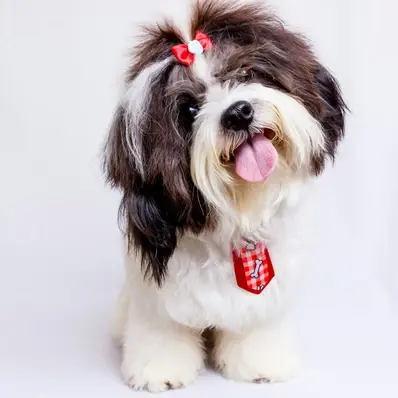Shih Tzu History/Origin
The Shih Tzu has ancient origins, shrouded in mystery and controversy. Recent studies reveal it as one of the 14 oldest dog breeds, with evidence of dogs in China dating back to 8,000 B.C. Some suggest Tibetan monks developed the breed and gifted them to Chinese royalty, while others speculate it was created in China by crossing breeds like the Lhasa Apso and Pekingese. Regardless, the Shih Tzu was a cherished companion from early times.
Art and writings from China’s Tang Dynasty (618-907 A.D.) depict small breed dogs resembling the Shih Tzu, with references reappearing around 990 A.D. Marco Polo noted that Mongolian Emperor Kubla Khan kept small “lion” dogs with his hunting lions to calm them, possibly referring to Shih Tzus.
During the Ming Dynasty (1368-1644), Chinese royals kept Shih Tzu-type dogs, described as intelligent and lion-like. Although mentions dwindled from the 1700s to the early 1900s, art from that period features small, shaggy, happy dogs.
In 1861, these purebred dogs gained prominence when Empress Tzu Hsi of China received Shih Tzus from the Dalai Lama. She was an animal lover and implemented strict breeding programs to preserve the breed.
After she died in 1908, royal families competed to produce the finest Shih Tzus, with high-quality dogs often smuggled out as gifts.
Shih Tzu History- Source: AKC.org
In 1928, Lady Brownrigg brought the first Shih Tzus to England from Peking. In 1933, Mrs. Hutchins brought another Shih Tzu to Ireland, eventually breeding it with Lady Brownrigg’s dogs, forming the foundation of her kennel.
Maureen Murdock and her nephew Philip Price were the first to import and breed Shih Tzu in the United States. By 1960, three Shih Tzu clubs had formed, which later merged to form the American Shih Tzu Club. The breed was recognized by the American Kennel Club in 1969 as a member of the Toy Group.
Shih Tzu Personality
The Shih Tzu’s historical role is clear: companionship. They’re not hunters, guards, or retrievers. Their sole desire is to be by your side. Affection defines them, and your lap is their go-to spot. Their joy stems from being with family, showering, and receiving attention.
- Shih Tzu Temperament
Shih Tzus are known for their friendly and affectionate temperament. They enjoy being around people and are often playful and outgoing. Additionally, they are loyal companions and love spending time with their owners.
- Potential challenges
Potential challenges for Shih Tzus include their tendency to bark at newcomers, requiring consistent training to manage. Due to their affectionate nature, they may suffer from separation anxiety if left alone for extended periods, necessitating gradual acclimation to alone time.
Moreover, their small size makes them fragile, requiring careful handling, especially around young children who may unintentionally harm them. It’s essential to consider these challenges before bringing a Shih Tzu into your home to ensure a harmonious relationship.
Shih Tzu Physical Appearance
Shih Tzus are one of the dog breeds that aren’t bred for strength or stamina; most people simply want them for their adorable looks. And in that department, they excel. Their tiny faces often elicit involuntary “awws,” thanks to their large, expressive eyes and button noses. Their ears, larger than expected, dangle like pendants.
One of the Shih Tzu’s prized features is their luxurious double coat of long, flowing hair, which comes in various colors.
- Shih Tzu Size
Shih Tzu typically reaches a height of nine to ten and a half inches and weighs between 9 to 16 pounds. This breed’s size is relatively consistent regardless of gender, making them compact and portable companions. Their small stature adds to their charm.
- Coat color
Shih Tzus boasts a generous double long coat, and flowing hair, which can come in a variety of colors including black, gray, brown, red, silver, white, and brindle. This luxurious coat adds to their appeal and distinguishes them as a breed known for their striking appearance.
Shih Tzu Gender Differences
Shih Tzu exhibits minimal gender differences, with both males and females sharing similar physical characteristics and temperament traits. Their uniformity in appearance and behavior makes them equally charming and endearing companions for pet parents. Whether male or female, Shih Tzus offers unwavering loyalty and affection to their owners.
Shih Tzu Feed/Nutrition
Adult Shih Tzus typically eat about 1/2 to 1 cup of high-quality dry food per day. However, the amount may vary depending on factors like size, age, activity level, and metabolism. You can also add broccoli as a healthy treat, as it provides vitamins and fiber while being low in calories.
Just like people, dogs have individual needs, so a highly active dog may need more food than a less active one. The quality of the dog food also matters as better-quality food provides more nourishment, requiring less quantity to meet your dog’s needs.
Shih Tzu Health
Shih Tzus are generally healthy, but like all breeds, they are prone to certain conditions and health issues:
- Ear infections: Shih Tzus are susceptible to ear infections due to their drop ears; preventive measures include regular ear cleaning with a veterinarian-recommended cleaner, avoiding excessive moisture in the ears, and monitoring for signs of infection.
- Brachycephalic Airway Syndrome: Shih Tzus may experience respiratory issues due to their flat-faced anatomy; preventive measures include keeping the dog in a cool environment during hot weather, avoiding strenuous exercise, and choosing breeds with longer muzzles.
- Patellar luxation: Patellar luxation is dislocation of the kneecap, leading to pain and lameness; preventive measures include avoiding obesity, providing regular moderate exercise, and monitoring the dog’s gait for signs of lameness.
- Juvenile renal dysplasia (JRD): JRD is a genetic defect of the kidneys seen in young dogs; preventive measures primarily involve responsible breeding practices, including genetic screening of parent dogs.
- Periodontal disease: Shih Tzus are susceptible to ear infections due to their drop ears; preventive measures include regular ear cleaning with a veterinarian-recommended cleaner, avoiding excessive moisture in the ears, and monitoring for signs of infection.
- Portosystemic liver shunt: Liver shunts are congenital abnormalities that bypass the liver’s cleansing function; preventive measures include responsible breeding practices, regular veterinary care, and monitoring for signs of liver dysfunction.
- Anal sac impaction: Anal sac impaction occurs when the anal sacs become blocked, leading to discomfort and potential infection; preventive measures include regular expression of the anal sacs by a veterinarian, maintaining a high-fiber diet to promoting regular bowel movements and monitoring for signs of discomfort or scooting behavior.
Moreover, guiding responsible breeding practices, which includes genetic screening and health testing of parent dogs, can help mitigate the risk of hereditary conditions in future generations. Encouraging Shih Tzu owners to schedule regular veterinary check-ups, administer vaccinations, and implement preventive care measures will further support their health and well-being throughout their lives.
Shih Tzu Care and Grooming
The Shih Tzu is a flexible and adaptable toy breed. They feel just as happy in a small city apartment as in a spacious suburban home. They thrive on companionship as they are companion animals. Because of their short faces, they can’t handle heat well and need to stay indoors in cool environments on hot days.
Early socialization and training are crucial to prevent timidity. Housebreaking can be challenging, so it’s important to avoid indoor accidents. Crate training helps with house training and travel. Their long, silky coats, available in colors like black, gray, red, and white, need daily brushing to prevent tangles and mats.
They also need regular baths to keep them clean and healthy. Many owners hire professional groomers to manage their coats more easily. Regular grooming, including nail trimming, ear cleaning, and dental care, keeps them healthy and happy. Additionally, house training your dog is essential to ensure good behavior and maintain a clean environment.
Shih Tzu Rescue Groups
If you’re looking to adopt a Shih Tzu, many rescue organizations specialize in rehoming this lovable breed. These groups can help you find the perfect Shih Tzu to welcome into your home. Consider reaching out to a Shih Tzu rescue group to find your new furry friend.
Shih Tzu Price
The price of a Shih Tzu typically ranges from $750 to $3,500, depending on factors such as breeder reputation, pedigree, and location.
When buying a Shih Tzu puppy, make sure to find reputable breeders who prioritize the health and well-being of their dogs. It’s essential to choose a breeder known for their ethical practices and commitment to the breed’s welfare.
Interesting Facts
- The Shih Tzu breed’s documented history spans over 1,000 years, with ancestral roots dating back to at least 1000 B.C. in China. Early records depict short, square-shaped dogs, likely the predecessors of the modern Shih Tzu.
- The Shih Tzu’s origins trace back to Tibet, where they were likely sent as gifts to Chinese royalty.
- Celebrity owners of Shih Tzu include Nicole Richie, Mariah Carey, Beyoncé, Colin Farrell, Bill Gates, and even Queen Elizabeth II.
Nicole Richie with Shih Tzu- Source: Pinterest
King George VI and Queen Elizabeth with Shih Tzu- Source: NDTV
- They have appeared in the National Dog Show 2023.
Best For
The Shih Tzu is best suited for individuals or families who can provide them with plenty of attention and affection. They thrive in environments where they can be closely bonded with their owners and receive regular companionship and care.
Top Names
| Male Shih Tzu Names | Female Shih Tzu Names |
| Max | Bella |
| Charlie | Daisy |
| Teddy | Lucy |
| Buddy | Molly |
| Oliver | Sophie |









 Shih Tzu History- Source:
Shih Tzu History- Source: 

 Black Shih Tzu – Source:
Black Shih Tzu – Source:  Brown Shih Tzu – Source:
Brown Shih Tzu – Source:  White Shih Tzu – Source:
White Shih Tzu – Source:  Brindle Shih Tzu – Source:
Brindle Shih Tzu – Source: 
 Nicole Richie with Shih Tzu- Source:
Nicole Richie with Shih Tzu- Source:  King George VI and Queen Elizabeth with Shih Tzu- Source:
King George VI and Queen Elizabeth with Shih Tzu- Source: 






